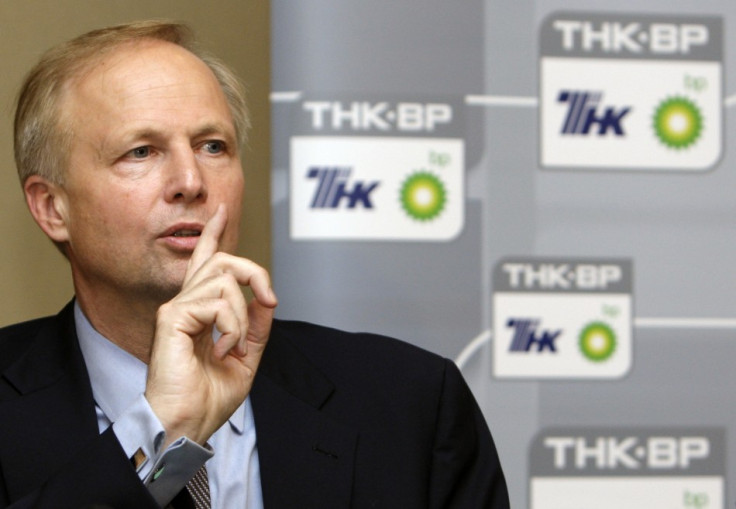BP Approached By Russian State-Owned Oil & Gas Group For TNK-BP Stake Sale: Report

BP is considering selling its 50 percent stake in the Russian joint venture TNK-BP, after being approached by a number of "unsolicited approaches", including one big that was made by a Russian state-owned oil and gas entity, according to an un-named source cited by Reuters.
Shares in Europe's second-biggest oil company is up over 2 percent, after gaining more than 4 percent in early London trading. The share price stands at 405.25p as of 1150 GMT.
BP confirmed in a statement today that it has notified its partner, Alfa Access Renova (AAR), which consists of a group of four Soviet-born billionaires, of its intention to pursue a potential sale, which could mark the end of one of the most adventurous energy business ventures in history.
While there is no official information over where the "unsolicited approaches" have stemmed from, market participants immediately suspected that a Russian government back energy group, such as Gazprom or Rosneft could be in the running, after the 50-50 owned UK and Russian company has encountered a troublesome relationship. Reuters sources have said Rosneft if not among the potential suitors.
TNK-BP could we worth as much as $40bn at current market values, according to some analysts. Last year, the joint venture contributed around 25 percent of BP's total production and $3.7bn of its total cash flow.
TNK-BP Troublesome History
TNK-BP was formed by BP and AAR in 2003, in a bid for the UK oil company to break into the lucrative but mainly state-owned energy sector in Russia.
BP agreed to an exact 50 percent stake, while AAR owned the other half. However, it was not a match made in heaven after Russia became more hostile to foreign and private sector investment and the Russian government was said to limit access to oil reserves to mainly wholly state-controlled entities.
TNK-BP has also become synonymous with in-fighting, after BPs periodic arguments with its Russian counterparts has led to allegations of certain parts of management being frozen out of decisions or a difficult co-operative working environment.
On Tuesday, Russian billionaire Mikhail Fridman resigned abruptly as chief executive of TNK-BP.
TNK BP did not add any other comment, other than confirm Fridman's resignation and that "after Mikhail Fridman's resignation, TNK-BP will be managed by a group of executives who hold powers of attorney related to their areas of responsibility. AAR shareholders German Khan and Victor Vekselberg remain with the business as Executive Directors and Members of the Management Board."
According to a source cited in the Financial Times, Fridman left over a "breakdown in governance."
Mission to Sell Assets
While, the news of BP possibly exiting the lucrative TNK-BP venture may cause some concern over BP's overall future oil production, the soaring share price indicates that the market is viewing the consideration, as a much-needed sale of assets.
BP has had to heavily depend on TNK-BP oil production over the last few years, after an explosion on BP's Horizon rig on the 20 April 2010, resulted in one of the largest oil spills and environmental disasters in history.
While the Gulf of Mexico oil spill resulted in an environmental disaster, it also caused colossal damage to the group's reputation and earnings. Even two years on, BP is still feeling the repercussions of the incident.
BP still faces significant legal liability for the disaster in the United States even after agreeing with the US Department of Justice to pay at least $7.8bn deal to victims of the explosion.
Moreover, just last week BP was slammed by another US federal investigation that centres on claims that BP representatives lied to Congress about how much oil had leaked into the Gulf of Mexico, following the Deepwater well blowout in 2010.
According to a report in the Wall Street Journal, the federal investigators findings could lead to additional criminal charges against current and former employees, should the investigators find evidence of wrong doing.
"Just as we worked with the government in responding to the spill, we are cooperating with its investigation," said a BP spokesperson to the IBTimes UK with no further comment on the report.
In late May, Bob Dudley, chief executive officer at London-based BP tried to quell investor concerns over the aftermath of the Gulf of Mexico oil spill, after selling off assets, lifting output and raising dividend.
Since the group is looking to sell assets but lift output in the Gulf of Mexico region, this sale could be exactly what BP needs.
© Copyright IBTimes 2025. All rights reserved.






















